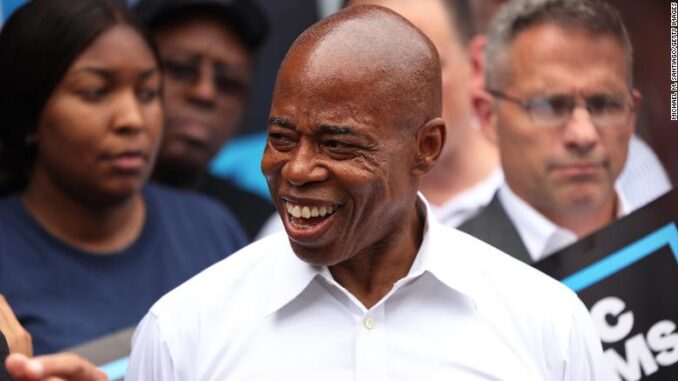
(CNN) – It looks like New York City’s first ranked-choice Democratic primary is finally — after two snafu-riddled weeks — coming to an end.

Eric Adams, the Brooklyn Borough President, is now projected to be the Democratic nominee and, barring some unforeseen circumstance, will be the next mayor of New York City. Adams, an African American, is a complex candidate. A former police officer who later served in the New York state senate, he has held his current position in Brooklyn since 2014.
He won by building a multi-racial, but politically moderate, coalition which was drawn both to his status as the only experienced politician among the four strongest candidates as well as to his years working in law enforcement.
As a longtime Democratic insider, Adams seemed to understand the dynamics of a Democratic primary in New York and was already a familiar face to Democratic voters in Brooklyn and to influential party leaders throughout the city. Additionally as a former cop and co-founder of 100 Blacks in Law Enforcement Who Care, Adams benefited from the perception, which grew stronger in the final months of the campaign, that crime was the biggest problem facing the city.
Unlike the other leading candidates — Kathryn Garcia, former sanitation commissioner; Maya Wiley, former counsel to Mayor Bill de Blasio; and Andrew Yang, former Democratic presidential candidate who lacked experience in elected office and relied heavily on social media messaging — he ran a more traditional campaign, building a coalition that appeared to draw on African American voters as well as older White and Latino voters, and one that proved quite effective in the post-pandemic era.
A few weeks ago, while cycling through my neighborhood, I happened upon Adams holding a press conference at Frederick Douglass Circle in Harlem with retired Rep. Charlie Rangel. It was a timeless New York City political event, and the older largely African American voters there seemed to be responding positively to Adams’ stories of struggle against poverty and police brutality, and of decades living as an African American in New York. While not particularly novel in its execution, it was powerful outreach to the kind of voters who would prove critical to his success.
Though Adams could never match Yang’s devoted online followers or Garcia’s strength among the centrist insiders who are so influential in the media, his personal story, endorsements from well-known elected officials and crime-fighting credentials resonated with older, pragmatic and heavily African American and White Catholic and Jewish primary voters. For many of these voters, Adams’s insider resume made him seem ready for the job, while his more moderate — in the context of heavily Democratic New York City — policies were similar to their own views.
That tough on crime message, in particular, became more effective over the course of the campaign. When the campaign began to draw attention toward the end of 2020, it seemed like Covid recovery would be the major issue. This initially benefited Andrew Yang whose enthusiasm for the city and numerous, if sometimes half-baked, proposals for the post-Covid city appealed to voters. Kathryn Garcia’s well-crafted message of competence and government know-how also benefited from this environment.
However, as the campaign progressed and the media began to tell a story of New York — where some forms of violent crime have recently risen — as being overrun by criminals, Adams’ law enforcement credentials and his opposition to defunding the police began to help him.
Still, Adams could never have won simply as the anti-crime candidate. While appealing to White voters as the anti-crime candidate, he also did very well among African American voters. In those communities, Adams’s own background and personal story, as well as familiarity to those voters — particularly in Brooklyn — were critical to his success. His anti-crime message did not hurt either among African American voters who feared crime rising in their neighborhoods.
It is possible to read too much into Adams’s narrow victory over both the centrist technocrat Garcia and the progressive Wiley — and Adams’s June 24 statement that he was the “face of the new Democratic party” still is a bit of a reach. Adams is not the only longtime insider in recent years to win a contested Democratic primary against more progressive and tech-savvy candidates who drew more media attention — and to do that by building a coalition of African American voters and older more conservative White voters.
Adams’ victory looks very much like President Joe Biden’s primary victory, albeit with something of a New York twist — and that may just be the key to the Democratic Party’s future electoral success.
END

Be the first to comment